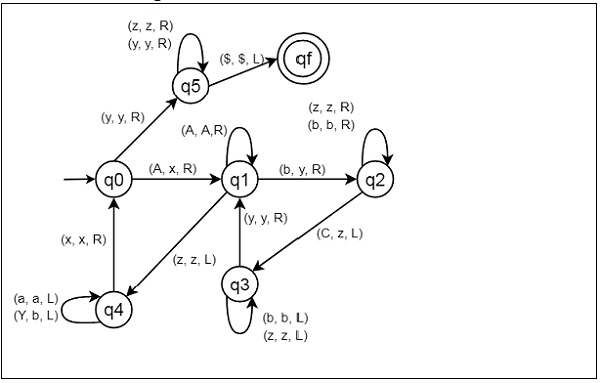
 Data Structure
Data Structure Networking
Networking RDBMS
RDBMS Operating System
Operating System Java
Java MS Excel
MS Excel iOS
iOS HTML
HTML CSS
CSS Android
Android Python
Python C Programming
C Programming C++
C++ C#
C# MongoDB
MongoDB MySQL
MySQL Javascript
Javascript PHP
PHP
- Selected Reading
- UPSC IAS Exams Notes
- Developer's Best Practices
- Questions and Answers
- Effective Resume Writing
- HR Interview Questions
- Computer Glossary
- Who is Who
Construct a Turing machine for L = {aibjck | i*j = k; i, j, k ≥ 1}
Here we will see how to make a Turing machine for language L = {AiBjCk | i * j = k; i, j, k ≥ 1}. So this represents a kind of language where we will use only three characters A, B and C. The w is a string. So if w = AABBBBCCCCCCCC, The Turing machine will accept it.
To solve this, we will use this approach.
First replace an A with x and move right. Then skip all the A’s and move right
When the head reach to the first B then replace one B with y, then move right skipping all intermediate B’s and corresponding to the replaced B now replace one C with z and move left.
Now move towards left skipping all z and B in the way.
When pointer reach the recent y, then move right.
If the pointer is pointing at B then repeat steps 2 to 4, otherwise when pointer is pointing at z then move towards left while replacing all y to B and skipping all A’s.
When pointer comes to most recent x move to step right.
If the pointer is still pointing to A then repeat all above steps, otherwise when the head is at y then move towards right skipping all y and z.
When $ is reached then move left. String is accepted.
State Transition Diagram


